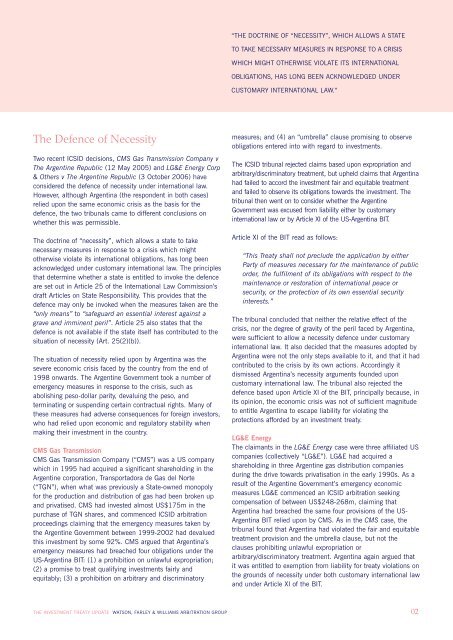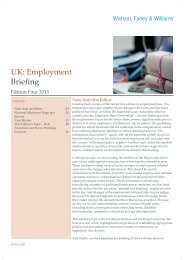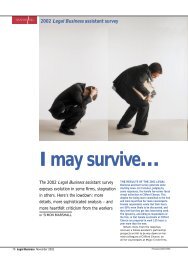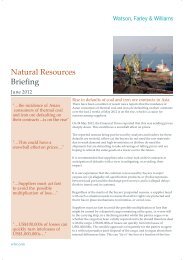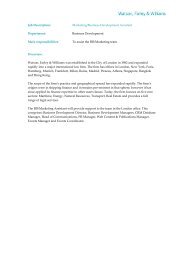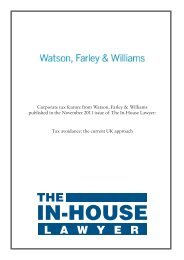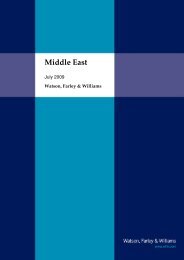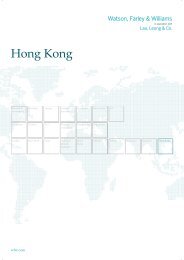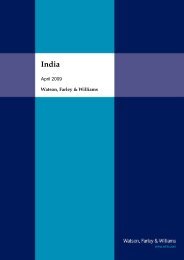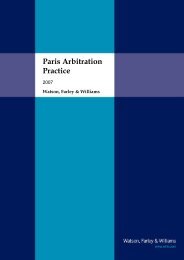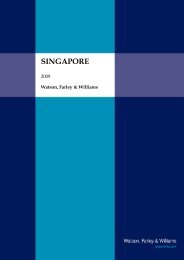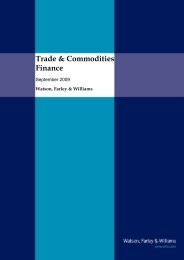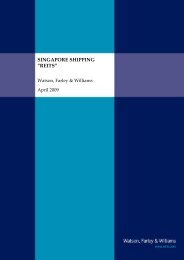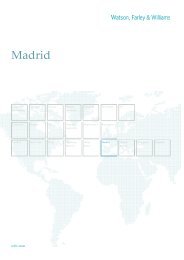Investment Treaty Update - Watson, Farley & Williams
Investment Treaty Update - Watson, Farley & Williams
Investment Treaty Update - Watson, Farley & Williams
You also want an ePaper? Increase the reach of your titles
YUMPU automatically turns print PDFs into web optimized ePapers that Google loves.
“THE DOCTRINE OF “NECESSITY”, WHICH ALLOWS A STATETO TAKE NECESSARY MEASURES IN RESPONSE TO A CRISISWHICH MIGHT OTHERWISE VIOLATE ITS INTERNATIONALOBLIGATIONS, HAS LONG BEEN ACKNOWLEDGED UNDERCUSTOMARY INTERNATIONAL LAW.”The Defence of NecessityTwo recent ICSID decisions, CMS Gas Transmission Company vThe Argentine Republic (12 May 2005) and LG&E Energy Corp& Others v The Argentine Republic (3 October 2006) haveconsidered the defence of necessity under international law.However, although Argentina (the respondent in both cases)relied upon the same economic crisis as the basis for thedefence, the two tribunals came to different conclusions onwhether this was permissible.The doctrine of “necessity”, which allows a state to takenecessary measures in response to a crisis which mightotherwise violate its international obligations, has long beenacknowledged under customary international law. The principlesthat determine whether a state is entitled to invoke the defenceare set out in Article 25 of the International Law Commission’sdraft Articles on State Responsibility. This provides that thedefence may only be invoked when the measures taken are the“only means” to “safeguard an essential interest against agrave and imminent peril”. Article 25 also states that thedefence is not available if the state itself has contributed to thesituation of necessity (Art. 25(2)(b)).The situation of necessity relied upon by Argentina was thesevere economic crisis faced by the country from the end of1998 onwards. The Argentine Government took a number ofemergency measures in response to the crisis, such asabolishing peso-dollar parity, devaluing the peso, andterminating or suspending certain contractual rights. Many ofthese measures had adverse consequences for foreign investors,who had relied upon economic and regulatory stability whenmaking their investment in the country.CMS Gas TransmissionCMS Gas Transmission Company (“CMS”) was a US companywhich in 1995 had acquired a significant shareholding in theArgentine corporation, Transportadora de Gas del Norte(“TGN”), when what was previously a State-owned monopolyfor the production and distribution of gas had been broken upand privatised. CMS had invested almost US$175m in thepurchase of TGN shares, and commenced ICSID arbitrationproceedings claiming that the emergency measures taken bythe Argentine Government between 1999-2002 had devaluedthis investment by some 92%. CMS argued that Argentina’semergency measures had breached four obligations under theUS-Argentina BIT: (1) a prohibition on unlawful expropriation;(2) a promise to treat qualifying investments fairly andequitably; (3) a prohibition on arbitrary and discriminatorymeasures; and (4) an “umbrella” clause promising to observeobligations entered into with regard to investments.The ICSID tribunal rejected claims based upon expropriation andarbitrary/discriminatory treatment, but upheld claims that Argentinahad failed to accord the investment fair and equitable treatmentand failed to observe its obligations towards the investment. Thetribunal then went on to consider whether the ArgentineGovernment was excused from liability either by customaryinternational law or by Article XI of the US-Argentina BIT.Article XI of the BIT read as follows:“This <strong>Treaty</strong> shall not preclude the application by eitherParty of measures necessary for the maintenance of publicorder, the fulfilment of its obligations with respect to themaintenance or restoration of international peace orsecurity, or the protection of its own essential securityinterests.”The tribunal concluded that neither the relative effect of thecrisis, nor the degree of gravity of the peril faced by Argentina,were sufficient to allow a necessity defence under customaryinternational law. It also decided that the measures adopted byArgentina were not the only steps available to it, and that it hadcontributed to the crisis by its own actions. Accordingly itdismissed Argentina’s necessity arguments founded uponcustomary international law. The tribunal also rejected thedefence based upon Article XI of the BIT, principally because, inits opinion, the economic crisis was not of sufficient magnitudeto entitle Argentina to escape liability for violating theprotections afforded by an investment treaty.LG&E EnergyThe claimants in the LG&E Energy case were three affiliated UScompanies (collectively “LG&E”). LG&E had acquired ashareholding in three Argentine gas distribution companiesduring the drive towards privatisation in the early 1990s. As aresult of the Argentine Government’s emergency economicmeasures LG&E commenced an ICSID arbitration seekingcompensation of between US$248-268m, claiming thatArgentina had breached the same four provisions of the US-Argentina BIT relied upon by CMS. As in the CMS case, thetribunal found that Argentina had violated the fair and equitabletreatment provision and the umbrella clause, but not theclauses prohibiting unlawful expropriation orarbitrary/discriminatory treatment. Argentina again argued thatit was entitled to exemption from liability for treaty violations onthe grounds of necessity under both customary international lawand under Article XI of the BIT.THE INVESTMENT TREATY UPDATE WATSON, FARLEY & WILLIAMS ARBITRATION GROUP 02


